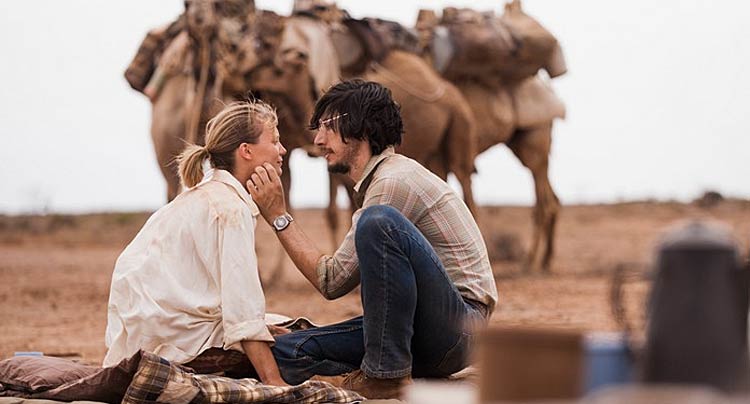
Assured performances and great cinematography can't elevate this ordinary take on an extraordinary tale.

Assured performances and great cinematography can't elevate this ordinary take on an extraordinary tale.
In 1977, 27 year-old Robyn Davidson embarked on what would become a 9 month, 1,700 mile journey across the Australian deserts. She traveled from the town of Alice Springs to the Indian Ocean, with 4 camels and a dog as her only companions. Her trip was first profiled in National Geographic before a book about her experiences was published in 1980. Now, 34 years later, Tracks has finally made it to the big screen.
Director John Curran opens two years before Davidson’s (Mia Wasikowska) trek, showing her arriving in Alice Springs and working with farmers in order to learn how to train camels. Davidson’s work only gets her so far, until a visit by National Geographic photographer Rick Smolan (Adam Driver) persuades her to let the magazine sponsor her voyage. After receiving the sponsorship money, with the condition that Smolan periodically rendezvous with Davidson for photos, she sets off.
Tracks naturally brings to mind other films about long, isolated journeys in nature like Into the Wild, Walkabout, Kon-Tiki and, to a much lesser extent, Life of Pi. Davidson establishes herself as a solitary person from the get-go, starting with a title card containing one of her quotes — “Some nomads are at home everywhere. Others are at home nowhere, and I was one of those.” — and reiterated throughout with her bristling at anyone’s suggestion of tagging along with her for a few days. Her reaction to Smolan’s arrival at different points on her trip is usually an annoyed one until the isolation gets to her. She starts sleeping with Smolan, but not out of romance (much to Smolan’s disappointment). She merely needs some sort of connection with another human being.

Of course, isolation is one of the film’s major themes, but Curran explores it in a way that’s neither refreshing nor interesting. Tracks limits itself with a simple, unsentimental take at Davidson’s story. The usual beats from a road trip film are all here: Davidson meets unique strangers along the way, bonds with someone she wouldn’t expect (this time an Aboriginal elder played by Roly Mintuma), faces tragedy along the way, and ultimately overcomes her childhood issues.
In this case, Davidson still hasn’t gotten over her mother’s suicide from when she was a child. Curran employs flashbacks to slowly reveal more details about her past. A method that is not only overly familiar, but reductive to Davidson’s story and a flaw on Curran and screenwriter Marion Nelson’s part. The film briefly touches on other inspirations for the 1,700 mile trip including gender, class, and race issues going on at the time, but they all unfairly take a back seat to Davidson’s grief over her mother’s death by the end. For a film dedicating most of its time to one character, it feels awfully limited in its portrayal.
But for a piece of conventional filmmaking, Tracks is well-made. Curran and cinematographer Mandy Walker film the Outback deserts with a serene, beautiful quality while showing its potential for danger. Wasikowska, looking eerily familiar to her real-life counterpart, is convincing in her role despite the narrow screenplay. The assured performances and great cinematography help to carry things along and there isn’t often a dull moment across its 2 hour length. Unfortunately those factors can’t elevate Tracks to something more than an ordinary take on an extraordinary tale.